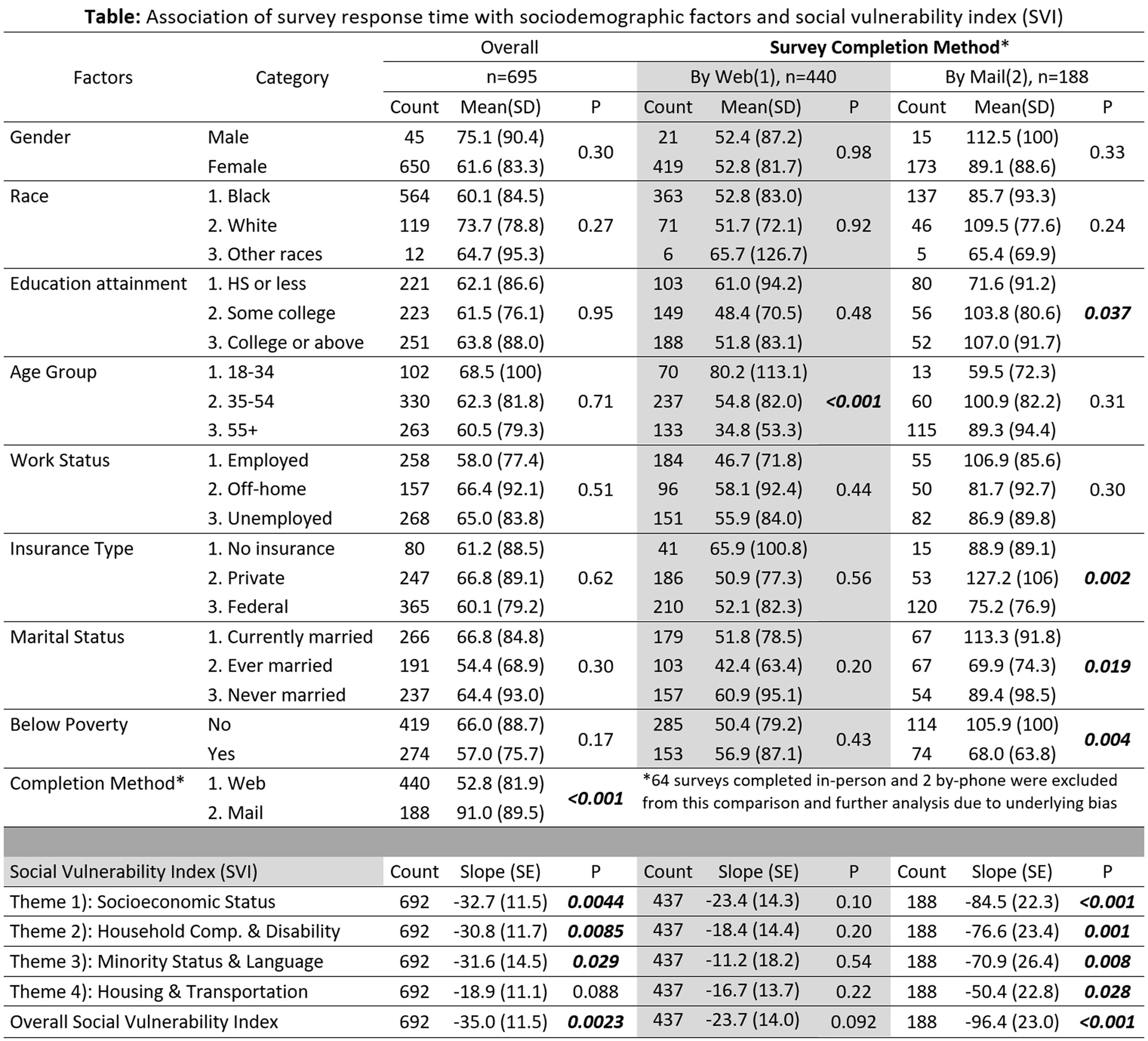Session Information
Date: Sunday, November 12, 2023
Title: (0145–0154) Epidemiology & Public Health – Interprofessional Poster
Session Type: Poster Session A
Session Time: 9:00AM-11:00AM
Background/Purpose: Social determinants of health (SDoH) significantly impact outcomes of Systemic lupus erythematosus (SLE) patients. However, little is known about the influence of SDoH on research participation in this population. We examined whether SDoH are associated with survey response times in a population-based SLE cohort. This is crucial as patient-reported outcomes are fundamental in capturing patient perspectives and informing healthcare interventions.
Methods: Data was sourced from the Georgians Organized Against Lupus (GOAL) 2018-2019 annual patient-reported survey, a population-based cohort study of validated SLE patients established in Atlanta, Georgia. Survey response times and completion methods (mail, web, in-person, and by-phone) were collected. Social Vulnerability Index (SVI), a census tract-based metric linked to participants’ home addresses, was used given its compressive characterization of neighborhood-level SDoH. Differences in the mean response times by sociodemographic factors and survey completion methods were tested using two-tailed two-sample t-tests or ANOVA. Associations between response time and SVIs (overall and four thematic SVIs) were explored using linear regression analysis.
Results: 695 participants were included in this analysis. The mean age was 50.3 years old [SD 13.4]. The majority of participants were female (93.5%) and black (81.1%). 11.5% of participants had no insurance, and 39.7% were below the federal poverty level. 188 (27.1%) surveys were completed by mail, 440 (63.3%) by web, and 66 (9.5%) in-person or by-phone (Table). The mean response time was significantly higher for surveys completed by mail than by web (91.0 vs. 52.8, p< 0.001). Among the surveys completed by mail, quicker response times were associated with participants with lower education (p=0.037), less insurance coverage (p=0.002), a non-married status (p=0.019), and income below the federal poverty level (p=0.004). Survey response times were negatively associated with overall SVI (slope=-96.4, p< 0.001), as well as all of its four subindices: socioeconomic status (slope=-84.5, p< 0.001), household composition & disability (slope=-76.6, p=0.001), minority status & language (slope=-70.9, p=0.008), and housing & transportation (slope=-50.4, p=0.028). No such associations were found in web surveys, though younger participants completed the survey faster online.
Conclusion: Our study shows that SDoH impact mail survey response times in the Georgian SLE population. The overall SVI and all of its subindices are significantly and negatively linked with response times. SDoH’s influence on response times varies based on the survey completion method, with insurance, marital, education, and poverty status significant for mail surveys but not web surveys. While requiring web-based surveys would be ideal, mail surveys are unavoidable, especially for those with limited access to technology. Tailored strategies are needed to address SDoH disparities when surveying the SLE populace, especially for underrepresented groups. Further studies are necessary to explore additional interventions to mitigate SDoH-related barriers in SLE patient surveys.
To cite this abstract in AMA style:
Bao D, Dunlop-Thomas C, Drenkard C, Lim S. Impact of Social Determinants of Health (SDoH) on Survey Response Times Among Lupus Patients [abstract]. Arthritis Rheumatol. 2023; 75 (suppl 9). https://acrabstracts.org/abstract/impact-of-social-determinants-of-health-sdoh-on-survey-response-times-among-lupus-patients/. Accessed .« Back to ACR Convergence 2023
ACR Meeting Abstracts - https://acrabstracts.org/abstract/impact-of-social-determinants-of-health-sdoh-on-survey-response-times-among-lupus-patients/

